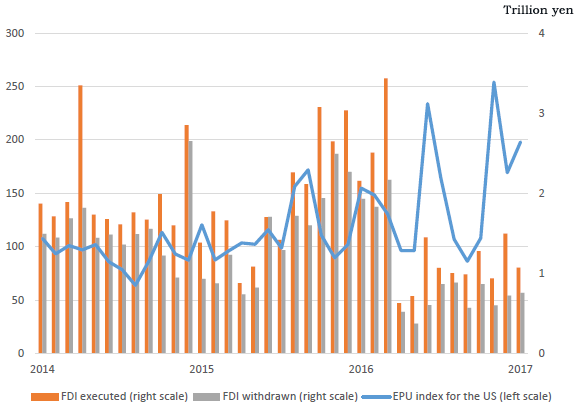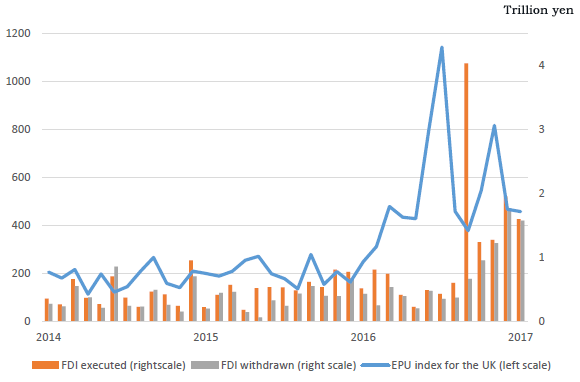Lately, people have been talking often about the unpredictability and uncertainty of the future course of the global economy. The advent of the Donald Trump administration that embraces the "America First" policy and the United Kingdom's decision to break away from the European Union (EU) have raised concern about how these developments will affect Japanese companies operating in or planning to enter the U.S. and European markets. Uncertainty is also growing over China's economic policy.
In this article, I would like to consider the relationship between the degree of uncertainty in overseas markets (chiefly regarding government policies in countries in which Japanese companies operate) and Japanese companies' operations in overseas markets. In particular, I will focus on their advancement into overseas markets as measured by foreign direct investment (FDI).
♦ ♦ ♦
To begin with, how can we measure the degree of policy uncertainty? As an indicator specifically designed to measure policy uncertainty, we can cite the Economic Policy Uncertainty (EPU) index developed by Northwestern University Associate Professor Scott R. Baker, Stanford University Professor Nicholas Bloom, and University of Chicago Professor Steven J. Davis.
Index values are based on the number of newspaper articles that contain all of the following three terms: 1) "uncertainty" or "uncertain," 2) "economic" or "economy," and 3) policy-related terms such as "legislation," "regulation," and "deficit." The higher the value of the EPU index, the greater is the degree of policy uncertainty.
In this manner, time series of the EPU index is being developed not only for the United States but also for the EU, China, and Japan. Earlier studies using the index have shown that increased policy uncertainty in the United States and Europe in recent years has had a significant negative impact on macroeconomic performance such as gross domestic product (GDP), industrial output, corporate capital investment, and employment.
Shown in Figure 1 are the changes in the EPU index for the United States and Japanese FDI in the United States over the period from January 2014 to January 2017. FDI flow data represent the amount of FDI executed or withdrawn in each month as reported in Japan's balance of payments. Subtracting the amount withdrawn from that executed results in net FDI assets.

The EPU index for the United States shows significant fluctuations from the latter half of 2015 through January 2017. In particular, the index spiked to a record high in June 2016, immediately before the presumptive presidential election nominees of the Democratic and Republican parties were set, and again in November 2016 when general voters casted ballots in the general election. The index dropped in December 2016 but rebounded in January 2017 when President Donald Trump assumed office.
Meanwhile, Japanese companies' investment activities in the United States have somewhat stagnated since April 2016, with the amounts of FDI executed and withdrawn falling below the levels in 2014 and 2015. My analysis, though not a rigorous one, found that many Japanese companies have postponed the execution of their planned FDI or withdrawal because of the irreversibility of FDI as well as greater adjustment costs involved in FDI as compared to securities investment. This suggests the possibility that uncertainty about the future has an inhibiting effect on FDI.
Now, what will happen to Japanese FDI in the United States under the new U.S. administration? The Trump administration's trade policy has two characteristics, namely, the promotion of exports through bilateral negotiations and "Buy American" exhortation. When people begin to prefer U.S.-made products because of higher tariffs on imports, more Japanese companies will invest in the United States.
The U.S. government has also been putting verbal pressure on foreign firms to invest in the United States, as seen in Trump's explicit criticism against Toyota Motor Corporation for planning to build a plant in Mexico. We can call this the "Invest in America" policy. There is a good possibility that Japanese companies will increase their investment in the United States in anticipation of the Trump administration's economic policy and resulting growth of the U.S. market.
♦ ♦ ♦
Meanwhile, when we look at the situation in Europe, changes in Japanese investment in the United Kingdom observed immediately after the Brexit vote in June 2016 are quite interesting. In the run-up to the Brexit referendum, the uncertainty of the UK economy (as measured by the EPU Index) rose to the highest level since the global financial crisis.
However, as shown in Figure 2, once the Brexit results were out, the EPU Index for the country fell significantly, and the amounts of FDI executed and withdrawn by Japanese companies in and from the United Kingdom increased sharply from July 2016 onward. This indicates that decreased uncertainty about the UK policy has made it easier for Japanese companies to make decisions on changes to their investment and business strategies.

Some companies are optimistic about the future of the UK economy and thus reacted by making investment, whereas others are pessimistic and withdrew their investment. Currently, many Japanese companies have their regional headquarters in the United Kingdom to implement the integrated management of operations across Europe. If Brexit brings drastic changes to the existing institutions and regulations that are compliant with EU rules, some Japanese companies may move their European headquarters to other countries for the convenience of doing business.
These observed facts about U.S. and UK policy uncertainty and Japanese companies FDI are essentially consistent with recent research findings by University of Oregon Assistant Professor Brandon Julio and Youngsuk Yook of the U.S. Federal Reserve Board of Governors.
They analyzed data on quarterly FDI flows from United States and data on elections in destination countries. As a result, they found that FDI flows from the United States drop by approximately 13% compared to quarters not affected by elections on average, with a greater FDI-depressing effect observed when elections are more competitive. They also showed that an increase in policy uncertainty in one country has a negative impact on transnational FDI flows from another country.
♦ ♦ ♦
Next, firm-level micro data suggest that uncertainty in overseas markets may have a negative impact on investment decisions by parent companies or their local subsidiaries because such uncertainty affects the outlook of multinationals' overseas subsidiaries. Regarding the possible operation of such mechanism, I would like to introduce findings from my research on uncertainty and Japanese companies' FDI in China.
Anti-Japanese demonstrations in September 2012, triggered by the sudden escalation of a Japan-China territorial dispute over a chain of islands, had a significant impact on the bilateral relationship and Japanese companies. In a joint research conducted with University of Hong Kong Assistant Professor Cheng Chen, Queen Mary University of London Assistant Professor Tatsuro Senga, and Chang Sun of Princeton University, we focused on uncertainty resulting from the deteriorated bilateral relationship. Using statistical data released from the Ministry of Economy, Trade and Industry, we examined how Japanese companies behaved in the face of this significant negative shock.
As the anti-Japanese demonstrations grew in scale, Japanese companies' local sales in China fell sharply in the second half of 2012, but rebounded strongly in 2013. Meanwhile, an increasing number of Japanese companies persistently underestimated their sales, resulting in the continuation of positive forecast errors.
Such forecast errors are perceived to reflect a manifestation of tail risk (the risk of an event that has a small probability of happening but could cause a massive loss if materialized) associated with a temporary decrease in sales or a downward swing in the business sentiment caused by increased uncertainty. As a result, capital investment by Japanese companies' local subsidiaries in China and FDI flows from Japan to China showed significant downward deviations from the overall trends.
In recent years, Japan has earned more of its surplus in international payments through FDIs, i.e., in the form of dividends received from overseas subsidiaries of Japanese companies, than by exports. Thus, in considering the spillover effects of uncertainty in overseas markets on Japan, it is important to look at not only changes in Japanese exports but also how revenues of Japanese companies' overseas subsidiaries, such as those in the United States, Europe, China, and Southeast Asian countries, are affected.
Policy uncertainty has a significant impact on the real economy. Not only uncertainty about economic policy at home but also economic and diplomatic policy uncertainty abroad pose serious economic consequences. Economic and diplomatic policy stability in host countries is becoming all the more important for Japanese companies expanding overseas operations.
* Translated by RIETI.
March 24, 2017 Nihon Keizai Shimbun


